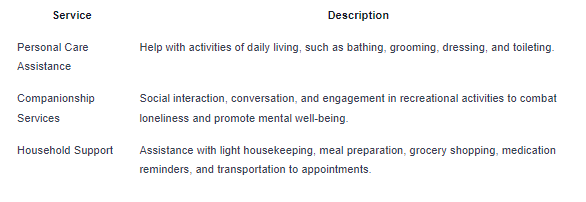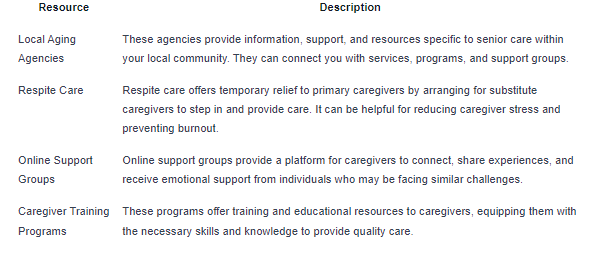What is Senior In-Home Care? Home Health Care Guide
March 4, 2025
Discover the power of senior in-home care! Learn about services, finding caregivers, and ensuring quality care for your loved ones.


Senior In-Home Care Essentials
When it comes to taking care of our aging loved ones, senior in-home care has become an increasingly popular option. This type of care allows seniors to receive assistance and support in the comfort of their own homes. In this section, we will explore the basics of senior in-home care, the benefits it offers, and the common services provided.
Understanding Senior In-Home Care
Senior in-home care refers to the professional assistance and support provided to elderly individuals within their own homes. It is designed to help seniors maintain their independence while receiving the necessary care and attention they need. In-home care services are typically provided by trained caregivers who assist with various activities of daily living, such as bathing, dressing, meal preparation, medication management, and mobility assistance.
By receiving care at home, seniors can continue living in a familiar environment, surrounded by their personal belongings and memories. This can have a positive impact on their overall well-being and quality of life.
Benefits of In-Home Care for Seniors
There are numerous benefits associated with senior in-home care. Some of the key advantages include:
- Personalized Care: In-home care allows for individualized care plans tailored to the specific needs and preferences of each senior. Caregivers can provide one-on-one attention and adjust the care as necessary.
- Independence and Comfort: Seniors can maintain their independence and dignity while receiving the necessary support. Being in a familiar environment promotes a sense of comfort and security.
- Cost-Effective: In many cases, in-home care can be a more cost-effective option compared to other forms of senior care, such as assisted living facilities or nursing homes. It allows seniors to receive the care they need without the additional expenses associated with facility-based care.
- Companionship: In-home caregivers not only provide assistance with daily tasks but also offer companionship and emotional support. This can help combat feelings of loneliness and isolation commonly experienced by seniors.
Common Services Provided
In-home care services encompass a wide range of assistance to meet the diverse needs of seniors. Some common services provided include:

These services can be tailored to the specific requirements of each senior, ensuring they receive the appropriate level of care.
Understanding the essentials of senior in-home care, its benefits, and the services provided is crucial when considering care options for your loved ones. By exploring the various aspects of in-home care, you can make informed decisions that prioritize the well-being and comfort of your aging family members.
Determining the Need for In-Home Care
When considering in-home care for seniors, it's important to assess whether it is necessary and determine the level of care required. This section will explore the signs that indicate the need for in-home care and provide guidance on how to assess the level of care needed.
Signs That In-Home Care May Be Necessary
It can be challenging to determine when a senior loved one requires in-home care. However, certain signs and indicators can help identify when additional support may be necessary. These signs include:
- Difficulty with activities of daily living (ADLs), such as bathing, dressing, and grooming.
- Increased forgetfulness or confusion, which may indicate cognitive decline.
- Unintentional weight loss or poor appetite.
- Lack of mobility or difficulty moving around the house safely.
- Medication mismanagement or forgetting to take prescribed medications.
- Increased incidents of falls or accidents at home.
- Social isolation and withdrawal from activities or relationships.
- Family caregivers experiencing burnout or being unable to meet the senior's needs adequately.
If you notice any of these signs in your loved one, it may be an indication that in-home care could be beneficial in ensuring their safety, well-being, and quality of life.
How to Assess the Level of Care Needed
Once you've recognized the need for in-home care, it's essential to assess the level of care required. This assessment helps determine the specific services and support your loved one needs. Consider the following factors when assessing the level of care:
- Activities of Daily Living (ADLs): Evaluate your loved one's ability to perform essential tasks independently, such as bathing, dressing, toileting, eating, and transferring from one place to another.
- Instrumental Activities of Daily Living (IADLs): Assess their capability to manage more complex activities, including meal preparation, medication management, transportation, housekeeping, and financial management.
- Medical Conditions and Health Care Needs: Consider any chronic illnesses, disabilities, or medical conditions your loved one has. Determine if specialized care or assistance with medication administration is necessary.
- Safety Concerns: Evaluate their risk of falls and accidents at home. Assess the need for modifications or assistive devices to ensure a safe living environment.
- Social and Emotional Needs: Consider their social engagement, emotional well-being, and cognitive functioning. Assess whether companionship and mental stimulation are required.
By carefully evaluating these factors, you can gain a better understanding of the level of care your loved one needs. This assessment will help guide your decision-making process when selecting appropriate in-home care services and support.
Remember, involving healthcare professionals, such as doctors or geriatric care managers, can provide valuable insights and expertise in assessing the level of care needed. Their input can help ensure that your loved one receives the appropriate level of in-home care tailored to their unique needs.
Types of In-Home Care Services
In-home care services are designed to provide assistance and support to seniors in the comfort of their own homes. These services can be tailored to meet individual needs and can encompass a range of tasks and activities. Here are three common types of in-home care services:
Personal Care Assistance
Personal care assistance focuses on helping seniors with activities related to their personal hygiene and daily living. Caregivers provide support with tasks such as bathing, grooming, dressing, and toileting. They may also assist with mobility, transfers, and medication reminders. The goal is to help seniors maintain their personal hygiene and independence while ensuring their safety and well-being.
Personal Care Assistance Services
Bathing Assistance
Grooming and Dressing Assistance
Toileting and Incontinence Care
Mobility and Transfer Assistance
Medication Reminders
Companionship Services
Companionship services play a vital role in addressing the social and emotional needs of seniors. Caregivers provide companionship, engage in conversations, and offer emotional support. They can accompany seniors on walks, assist with hobbies and activities, and provide transportation for outings and appointments. Companionship services help alleviate loneliness and promote a sense of well-being and connection.
Companionship Services
Conversation and Companionship
Assistance with Hobbies and Activities
Accompanying on Walks
Transportation Assistance
Emotional Support
Household Support
Household support services focus on helping seniors with various household tasks and chores. Caregivers assist with light housekeeping, including cleaning, laundry, and organization. They can also help with meal planning, preparation, and grocery shopping. Household support services aim to create a safe, clean, and comfortable environment for seniors, allowing them to maintain their independence at home.
Household Support Services
Light Housekeeping
Laundry and Linen Changes
Meal Planning and Preparation
Grocery Shopping
Home Organization
These types of in-home care services can be customized to meet the specific needs of each senior. By providing personalized assistance, companionship, and household support, in-home caregivers contribute to the overall well-being and quality of life for seniors who wish to age in the comfort of their own homes.
Finding the Right Caregiver
When it comes to senior in-home care, finding the right caregiver is essential for ensuring the well-being and comfort of your loved one. A caregiver plays a crucial role in providing assistance, support, and companionship. Here are some qualities to look for in a caregiver and questions to ask during the interview process.
Qualities to Look for in a Caregiver
When selecting a caregiver for your loved one, it's important to consider their qualifications, experience, and personal attributes. Here are some qualities to look for in a caregiver:
- Compassion: A compassionate caregiver understands the unique needs and challenges of seniors and can provide emotional support and empathy.
- Patience: Seniors may require extra time and patience when it comes to daily activities. A caregiver who is patient and understanding can create a positive and comfortable environment.
- Reliability: Dependability is crucial in in-home care. Look for a caregiver who is punctual, responsible, and committed to providing consistent care.
- Trustworthiness: Since the caregiver will be working closely with your loved one, it's important to find someone who is trustworthy, honest, and respectful.
- Flexibility: Senior care needs can change over time. A caregiver who is adaptable and flexible can adjust to evolving care requirements and provide personalized assistance.
- Good Communication Skills: Effective communication is key in providing quality care. Look for a caregiver who can communicate clearly and effectively with both the senior and the family members.
- Experience and Training: Consider the caregiver's experience and training in providing senior care. This can include certifications, specialized training, and experience with specific medical conditions or mobility challenges.
Questions to Ask When Interviewing Caregivers
During the interview process, asking the right questions can help you assess whether the caregiver is the right fit for your loved one's needs. Here are some important questions to ask:
- Can you provide references from previous clients or employers?
- What experience do you have in providing care for seniors with similar needs or conditions?
- How do you handle emergencies or unexpected situations?
- Are you comfortable with the specific tasks and responsibilities required for the job?
- How do you ensure the safety and security of the senior in their home?
- Can you describe your approach to providing emotional support and companionship?
- How do you communicate and collaborate with family members or other healthcare professionals involved in the senior's care?
- Are you available for the required schedule and hours of care needed?
- What is your process for documenting and reporting any changes in the senior's condition or daily activities?
- How do you approach maintaining confidentiality and respecting the privacy of the senior?
Asking these questions can help you gauge the caregiver's qualifications, compatibility, and their ability to meet the specific needs of your loved one. It's important to take the time to thoroughly interview potential caregivers to ensure you find the best match for your senior's in-home care needs.
Making the Transition to In-Home Care
When considering in-home care for seniors, it's important to prepare both the home environment and the individual receiving care for a smooth transition. This section will cover two key aspects of the transition: preparing your home for a caregiver and adjusting to having a caregiver in your home.
Preparing Your Home for a Caregiver
Before the caregiver arrives, it's essential to make necessary adjustments to ensure a safe and comfortable environment for everyone involved. Here are a few steps to consider when preparing your home for a caregiver:
- Clearing Clutter: Remove any hazards or obstacles that could pose a risk of falls or accidents. This includes removing loose rugs, organizing cords, and ensuring clear pathways throughout the home.
- Making Accessibility Modifications: Assess the home for any necessary modifications to accommodate the individual's mobility needs. This may involve installing grab bars in the bathroom, adding handrails on staircases, or widening doorways for wheelchair accessibility.
- Organizing Essentials: Ensure that the caregiver has easy access to essential items such as medical supplies, medications, emergency contact information, and any relevant documents. It's also helpful to provide a clear schedule or routine for daily tasks and activities.
- Addressing Safety Concerns: Install smoke detectors, carbon monoxide detectors, and fire extinguishers in appropriate locations. Consider placing non-slip mats in the bathroom and providing adequate lighting throughout the home.
Adjusting to Having a Caregiver in Your Home
Having a caregiver in your home can be a significant adjustment for both the individual receiving care and their family members. Here are some tips to help ease the transition:
- Open Communication: Establish open and honest communication with the caregiver. Clearly communicate expectations, preferences, and any specific needs or concerns. Regularly check in with the caregiver to ensure that everyone is on the same page.
- Respecting Boundaries: Allow the caregiver to perform their duties without unnecessary interference. While it's important to be involved, it's equally important to respect the caregiver's expertise and professional boundaries.
- Building Trust: Take the time to build a trusting relationship with the caregiver. This can be achieved by fostering open communication, showing appreciation for their work, and addressing any concerns in a respectful manner.
- Maintaining Independence: Encourage the individual receiving care to maintain their independence to the extent possible. This may involve allowing them to make decisions, engage in activities they enjoy, and participate in their own care as much as their abilities permit.
By preparing your home and adjusting to the presence of a caregiver, you can create a supportive environment that promotes the well-being of the individual receiving care. Remember, open communication, respect, and trust are key to a successful transition to in-home care.
Ensuring Quality Care
When it comes to senior in-home care, ensuring quality care is of utmost importance. It involves monitoring the care provided, maintaining open communication with caregivers, and utilizing resources for additional support.
Monitoring the Care Provided
Monitoring the care provided to seniors receiving in-home care is essential to ensure their well-being. Here are some aspects to consider when monitoring the care:
- Care Plan Adherence: Regularly review the care plan developed by the caregiver and ensure that it is being followed. This includes verifying medication administration, assistance with personal care, and any other services specified in the plan.
- Observation: Observe the senior's overall health and well-being. Look for any changes in physical or mental condition, signs of discomfort, or issues with mobility. Regularly communicate with the caregiver to address any concerns.
- Documentation: Maintain a record of the care provided. This can include documenting medication schedules, noting any changes in behavior or health, and tracking appointments or therapy sessions. This documentation can serve as a reference for healthcare professionals and provide insights into the senior's progress.
Communication with Caregivers
Open and effective communication with caregivers is crucial for ensuring quality care for seniors. Here are some tips for maintaining good communication:
- Regular Check-Ins: Schedule regular check-ins with the caregiver to discuss any updates, concerns, or changes in the senior's condition. This can be done through in-person meetings, phone calls, or video chats.
- Clear Expectations: Clearly communicate your expectations regarding the care provided. Discuss specific tasks, routines, and any preferences or special instructions related to the senior's care.
- Feedback and Collaboration: Provide constructive feedback to the caregiver and encourage open dialogue. Collaboration between the caregiver, the senior, and the family members can lead to improved care and a better understanding of the senior's needs.
Resources for Additional Support
Accessing resources for additional support can enhance the quality of senior in-home care. Here are some resources to consider:

By actively monitoring the care provided, maintaining open communication with caregivers, and utilizing available resources, seniors can receive the highest level of quality care in the comfort of their own homes. This ensures their well-being, promotes independence, and enhances their overall quality of life.
Sources
https://hmtransport.com/what-is-senior-in-home-care/
https://www.bayada.com/homehealthcare/what-is-homecare/
https://www.helpguide.org/articles/senior-housing/home-care-services-for-seniors.htm
Similar articles

Benefits of Group Therapy in Rehabilitation Facilities

How to Develop a Positive Mindset for Rehabilitation Success

How to Build Confidence After Surgery or Injury

How to Manage Post-Traumatic Stress After an Injury

Managing Chronic Illness with Short-Term Rehabilitation

Creating a Daily Recovery Checklist for Patients
Contact us today and experience ”The Name in Healthcare”
Where compassion, well-being, and a welcoming community converge to redefine your healthcare journey. Welcome to Rosewood, where your family becomes our family.














